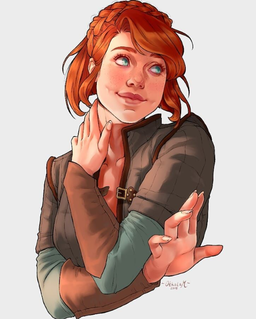Eglantine Belwyse
History
Still need to write up her background.
Attributes and Proficiencies
| Strength 8 | Save -1 | Athletics +0 | ||||
| Dexterity 16 | Save +6 | Initiative +4 | Acrobatics +4 | Slight of Hand +4 | Stealth +9 | |
| Constitution 14 | Save +2 | Hit Points 38 | Hit Dice 5d8 | |||
| Intelligence 12 | Save +1 | Arcana +4 | History +4 | Investigation +7 | Nature +4 | Religion +2 |
| Wisdom 10 | Save +0 | Animal Handling +1 | Insight +3 | Medicine +1 | Perception +3 | Survival +1 |
| Charisma 18 | Save +7 | Deception +7 | Intimidation +5 | Performance +5 | Persuasion +7 |
| Tools | calligrapher, cartographer, drum, pan flute |
| Weapons | simple weapons, hand crossbows, longswords, rapiers, shortswords |
| Armor | light |
| Languages | Acalan, Havlin, Senat |
Abilities & Feats
Researcher: When you attempt to learn or recall a piece of lore, if you do not know that information, you often know where and from whom you can obtain it. Usually, this information comes from a library, scriptorium, university, or a sage or other learned person or creature. Your DM might rule that the knowledge you seek is secreted away in an almost inaccessible place, or that it simply cannot be found. Unearthing the deepest secrets of the multiverse can require an adventure or even a whole campaign.
Lucky: When you roll a 1 on an attack roll, ability check, or saving throw, you can reroll the die. You must use the new result, even if it is a 1.
Brave: You have advantage on saving throws against being frightened.
Nimble: You can move through the space of any creature that is of a size larger than yours.
Naturally Stealthy: You can attempt to hide even when you are only obscured by a creature that is at least one size larger than you.
Fey Touched: Charisma +1; You learn Misty Step ☐ and Bless ☐. You can cast each of these spells without expending a spell slot. Once you cast either of these spells in this way, you can’t cast that spell in this way again until you finish a long rest. You can also cast these spells using spell slots you have of the appropriate level. The spells’ spellcasting ability is the ability increased by this feat.
Shadow Touched: Charisma +1; You learn Invisibility ☐ and Inflict Wounds ☐. You can cast each of these spells without expending a spell slot. Once you cast either of these spells in this way, you can’t cast that spell in this way again until you finish a long rest. You can also cast these spells using spell slots you have of the appropriate level. The spells’ spellcasting ability is the ability increased by this feat.
Spellcasting 1st ☐☐☐☐ 2nd ☐☐☐ 3rd ☐☐
Save DC 16, Spell Attack +8
can use a musical instrument as a focus for bard spells
can cast any bard spell you know as a ritual if that spell has the ritual tag
Cantrips Known: Light, Mage Hand, Vicious Mockery
Spells Known:
(1st) Comprehend Languages, Detect Magic, Dissonant Whispers, Healing Word, Unseen Servant
(2nd) Aid, Enhance Ability
(3rd) Leomund’s Tiny Hut
Bardic Inspiration: d8 ☐☐☐☐
You can inspire others through stirring words or music. To do so, you use a bonus action on your turn to choose one creature other than yourself within 60 feet of you who can hear you. That creature gains one Bardic Inspiration die. You regain any expended uses when you finish a short or long rest.
Once within the next 10 minutes, the creature can roll the die and add the number rolled to one ability check, attack roll, or saving throw it makes. The creature can wait until after it rolls the d20 before deciding to use the Bardic Inspiration die, but must decide before the DM says whether the roll succeeds or fails. Once the Bardic Inspiration die is rolled, it is lost. A creature can have only one Bardic Inspiration die at a time.
If a creature has a Bardic Inspiration die from you and casts a spell that restores hit points or deals damage, the creature can roll that die and choose a target affected by the spell. Add the number rolled as a bonus to the hit points regained or the damage dealt. The Bardic Inspiration die is then lost.
Song of Rest:
Beginning at 2nd level, you can use soothing music or oration to help revitalize your wounded allies during a short rest. If you or any friendly creatures who can hear your performance regain hit points at the end of the short rest by spending one or more Hit Dice, each of those creatures regains an extra 1d6 hit points.
Cutting Words:
When a creature that you can see within 60 feet of you makes an attack roll, an ability check, or a damage roll, you can use your reaction to expend one of your uses of Bardic Inspiration, rolling a Bardic Inspiration die and subtracting the number rolled from the creature's roll. You can choose to use this feature after the creature makes its roll, but before the DM determines whether the attack roll or ability check succeeds or fails, or before the creature deals its damage. The creature is immune if it can't hear you or if it's immune to being charmed.
